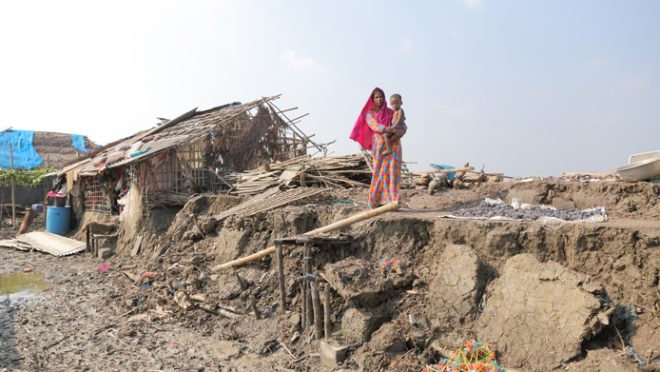How climate change discriminates against genders
How climate change discriminates against genders

To simplify the issue at hand, a low-lying land like ours with the Bay of Bengal to the south puts coastal areas and its populace at risks of facing increased natural disasters.
With a large part of the coastal area being rural, there is significant vulnerability in terms of clean water supplies, as salinity intrusion from the saltwater makes many sources such as springs and ponds unusable. On top of that, food supplies and education in the rural villages are adversely affected too.
While issues like climate change affect a community entirely, what is often not talked about much is the extent to which it affects different people within the community, especially men and women.
Women are affected by climate change on multiple fronts, from education and food to the basic practice of hygiene. In places where traditional patriarchal norms still remain deeply rooted, women are burdened with limitations with regards to the type of work they may do. Household chores are often forced on them due to inferior educational or physical abilities, and much of this is unpaid too.
With the worsening climate situation, the higher frequency of climate-related disasters mean that women are likelier to spend more time looking after families during the post-disaster recovery phase of the disasters. The existing reluctance to educate women in backdated societies will further worsen, as they will have less time to spend on education.
A recent study by UN Women Bangladesh reveals that over 70% of migrants in Dhaka originate from coastal regions that suffer significantly from cyclones, floods, salinity intrusion, and rising sea levels. Since many of these migrants do not have high educational qualifications, they turn to manual labour.
With dire financial needs, migrant women are forced to work as well, mostly as house-help.
Proper working conditions may not always be maintained, and the rising supply of migrants can push their wages down too. Instances of underpaying them occur more often, exacerbating the gender pay gap and creating economic disparities.
Sanitation and access to medical care may also be disrupted with increasing climate change. For both migrants and those living in coastal areas, finding proper sources of clean water and necessary sanitary products can be demanding. Without access to these, women put themselves at risk of various diseases and infections.
Despite being the majority gender, the exclusion of women in climate change decision making can lead to their issues being unheard and unnoticed. Understanding the problems across various demographics in society and integrating them into climate change solutions is essential for the collective fight against global warming. Greater inclusivity can help build a society that empowers everyone equitably, and puts communities on the track of higher prosperity.


